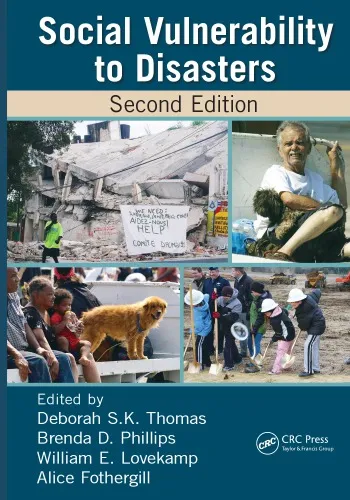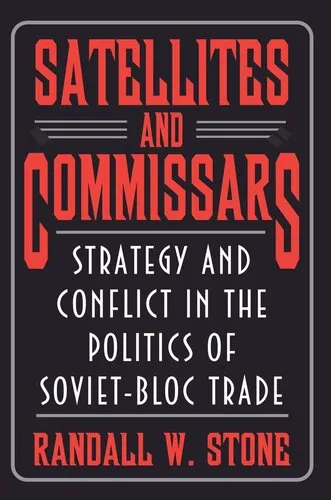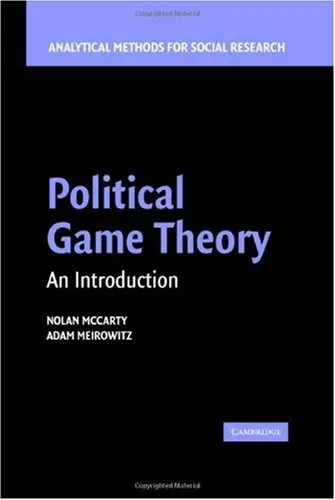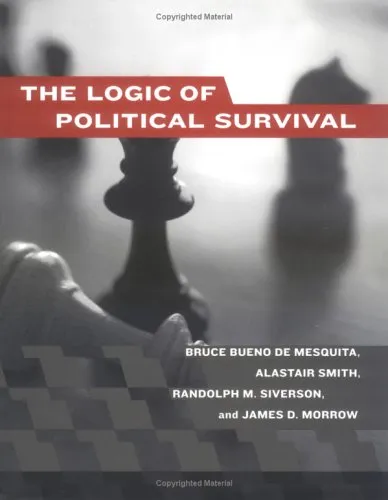Social Vulnerability to Disasters
4.5
بر اساس نظر کاربران

شما میتونید سوالاتتون در باره کتاب رو از هوش مصنوعیش بعد از ورود بپرسید
هر دانلود یا پرسش از هوش مصنوعی 2 امتیاز لازم دارد، برای بدست آوردن امتیاز رایگان، به صفحه ی راهنمای امتیازات سر بزنید و یک سری کار ارزشمند انجام بدینکتاب های مرتبط:
معرفی کتاب "Social Vulnerability to Disasters"
کتاب "Social Vulnerability to Disasters" بهعنوان یکی از منابع مهم و معتبر در حوزه مدیریت بحران و مطالعات اجتماعی شناخته میشود. این کتاب متمرکز بر مفهوم "Social Vulnerability" یا همان آسیبپذیری اجتماعی است و بررسی میکند که چگونه افراد، جوامع و گروههای مختلف تحت تأثیر بلایای طبیعی و انسانی قرار میگیرند. این اثر تحلیلی عمیق از عوامل چندگانهای که باعث کاهش یا افزایش آسیبپذیری در بلایا میشوند، ارائه میدهد و بر راهبردهای کاهش اثرات تأکید میکند.
خلاصهای از کتاب
این کتاب با تمرکز بر تئوریها، تحقیقات میدانی و مثالهای واقعی درک عمیقی از اینکه چرا برخی از گروهها و جوامع بهویژه آسیبپذیرتر از دیگران هستند، ارائه میدهد. نویسندگان بحث میکنند که عواملی نظیر نابرابریهای اجتماعی، اقتصادی، و فرهنگی چگونه آسیبپذیری در بلایا را تشدید میکنند. برای مثال، جمعیتهای خاصی مانند سالمندان، افراد دارای معلولیت، مهاجران، اقلیتهای نژادی و فقرا بیشترین آسیب را در هنگام بحرانها متحمل میشوند. این کتاب همچنین نگاه انتقادی به سیاستگذاری و اقدامات مدیریتی در هنگام بلایا دارد و پیشنهاد میکند که مدیریت بحران باید با درنظرگرفتن عدالت اجتماعی و ایجاد ارتباط بین بخشهای مختلف جامعه انجام شود.
نکات کلیدی کتاب
- تأثیر نابرابریهای اجتماعی و اقتصادی بر میزان آسیبپذیری در برابر بلایا.
- اهمیت سیاستگذاری مبتنی بر عدالت و شمول اجتماعی در کاهش خطرات.
- تأکید بر همکاری بینالمللی و محلی برای کاهش مخاطرات و مدیریت بهتر بحرانها.
- معرفی رویکردهای عملی و دادهمحور برای بررسی آسیبپذیری در جوامع مختلف.
جملات معروف از کتاب
"آسیبپذیری اجتماعی تنها تحت تأثیر عوامل فردی نیست؛ بلکه توسط ساختارهای قدرت، نابرابری و سیاستگذاریها تشدید میشود."
"برای کاهش بلایا، تغییر سیستم باید به اندازه تغییر نگرش افراد ضروری باشد."
چرا این کتاب اهمیت دارد؟
کتاب "Social Vulnerability to Disasters" تنها تحلیل علمی یا آکادمیک نیست، بلکه راهنمای عملی است که متخصصین مدیریت بحران، سیاستگذاران و حتی افراد عادی میتوانند از آن بهره ببرند. در جهانی که بحرانها و بلایا همواره در حال افزایش هستند، درک اینکه چگونه میتوان از آسیبهای اجتماعی جلوگیری کرد و یا آنها را کاهش داد، ضروری است. این کتاب ابزارهای مفیدی برای تحلیل و کاهش آسیبپذیری اجتماعی ارائه میدهد و از این رو، تأثیری عمیق بر برنامهریزی و اقدامات آینده دارد.
Introduction to "Social Vulnerability to Disasters"
Disasters—whether natural, technological, or human-induced—strike indiscriminately, but their impacts often highlight existing inequities within society. “Social Vulnerability to Disasters,” written by Thomas, Deborah S.K., Phillips, Brenda D., Lovekamp, William E., and Fothergill, Alice, delves into this complex interplay between disasters and social vulnerabilities. This comprehensive resource serves as a cornerstone for understanding how factors such as race, gender, socioeconomic status, age, disability, and other social determinants influence disaster preparedness, response, recovery, and mitigation. By tackling these pressing issues, the book aims to equip students, scholars, practitioners, and policymakers with actionable insights to build more resilient communities.
Through critical analysis, in-depth case studies, and practical strategies, this book offers a robust framework for assessing and addressing social vulnerability in disaster management systems. It underscores the importance of equity and justice in reducing the disparities apparent during disasters, thus advocating for a more inclusive and compassionate approach to disaster preparedness and recovery. This introduction explores the central themes and essential takeaways from the book, emphasizing its value as a vital resource in the field.
Detailed Summary of the Book
“Social Vulnerability to Disasters” provides informed perspectives on the intersection of social structures and disaster management. It introduces the concept of "social vulnerability," which refers to the unique challenges certain populations face before, during, and after disasters due to systemic inequalities. Across its chapters, the book examines key themes such as how poverty affects disaster recovery, the disproportionate risks faced by women and children, and the struggles endured by marginalized populations, such as indigenous groups, seniors, and people with disabilities.
Using interdisciplinary research, the authors highlight why some groups suffer more during disasters, both due to pre-existing societal inequities and institutional failures in disaster relief systems. The book also asserts that an equitable approach to disaster management must include engagement with and tailored support for vulnerable populations. Case studies from around the globe illustrate these issues, from Hurricane Katrina to international events such as the Indian Ocean Tsunami, emphasizing that social vulnerability is a universal concern that transcends borders.
Beyond simply identifying issues, the book calls for systemic reforms in disaster planning processes. It urges organizations and governments alike to prioritize social justice, seek diverse perspectives, and ensure the voices of vulnerable populations are included at every stage of disaster preparedness and recovery. This makes the book not just an academic exploration but a tool for meaningful change in both policy and practice.
Key Takeaways
- Social vulnerabilities are deeply interconnected with systemic inequalities, such as discrimination, poverty, and lack of access to healthcare.
- Traditional disaster management often excludes perspectives from marginalized communities, exacerbating disparities during crises.
- Integrating equity, justice, and participatory approaches into disaster management can create stronger, more inclusive systems.
- Building resilience requires not just technical interventions, but also addressing social determinants of vulnerability.
- Case studies provide powerful examples of both failures and successful models that can inform future disaster management strategies.
Famous Quotes from the Book
"A disaster is not just a singular event; it is a light shone on existing societal inequities and vulnerabilities."
"Resilience cannot be achieved without recognizing and addressing the root causes of vulnerability."
"Effective disaster management is people-centered, equity-driven, and attentive to the diverse needs of all communities."
Why This Book Matters
Disasters, while often seen as moments of chaos, are also moments of revelation. They expose the fractures and fault lines in our social systems, disproportionately impacting those who are already the most vulnerable. “Social Vulnerability to Disasters” stands out as an essential contribution to the literature on disaster management because it goes beyond technical solutions and takes a deeply humanistic approach. By examining the social and structural barriers that perpetuate vulnerability, the book challenges us to rethink how we approach disasters from the ground up.
This book matters because it addresses the pressing need for equity and justice in disaster management, providing both a theoretical foundation and practical frameworks for transformation. Whether you are a student looking to explore the concepts of vulnerability and resilience or a policymaker striving to implement more inclusive and effective disaster policies, this book is an invaluable tool. It calls us to action, reminding readers that addressing social vulnerability is not just a task for governments or aid organizations—it is a moral imperative for everyone involved in disaster management.
دانلود رایگان مستقیم
شما میتونید سوالاتتون در باره کتاب رو از هوش مصنوعیش بعد از ورود بپرسید
دسترسی به کتابها از طریق پلتفرمهای قانونی و کتابخانههای عمومی نه تنها از حقوق نویسندگان و ناشران حمایت میکند، بلکه به پایداری فرهنگ کتابخوانی نیز کمک میرساند. پیش از دانلود، لحظهای به بررسی این گزینهها فکر کنید.
این کتاب رو در پلتفرم های دیگه ببینید
WorldCat به شما کمک میکنه تا کتاب ها رو در کتابخانه های سراسر دنیا پیدا کنید
امتیازها، نظرات تخصصی و صحبت ها درباره کتاب را در Goodreads ببینید
کتابهای کمیاب یا دست دوم را در AbeBooks پیدا کنید و بخرید
1476
بازدید4.5
امتیاز0
نظر98%
رضایتنظرات:
4.5
بر اساس 0 نظر کاربران
Questions & Answers
Ask questions about this book or help others by answering
No questions yet. Be the first to ask!















